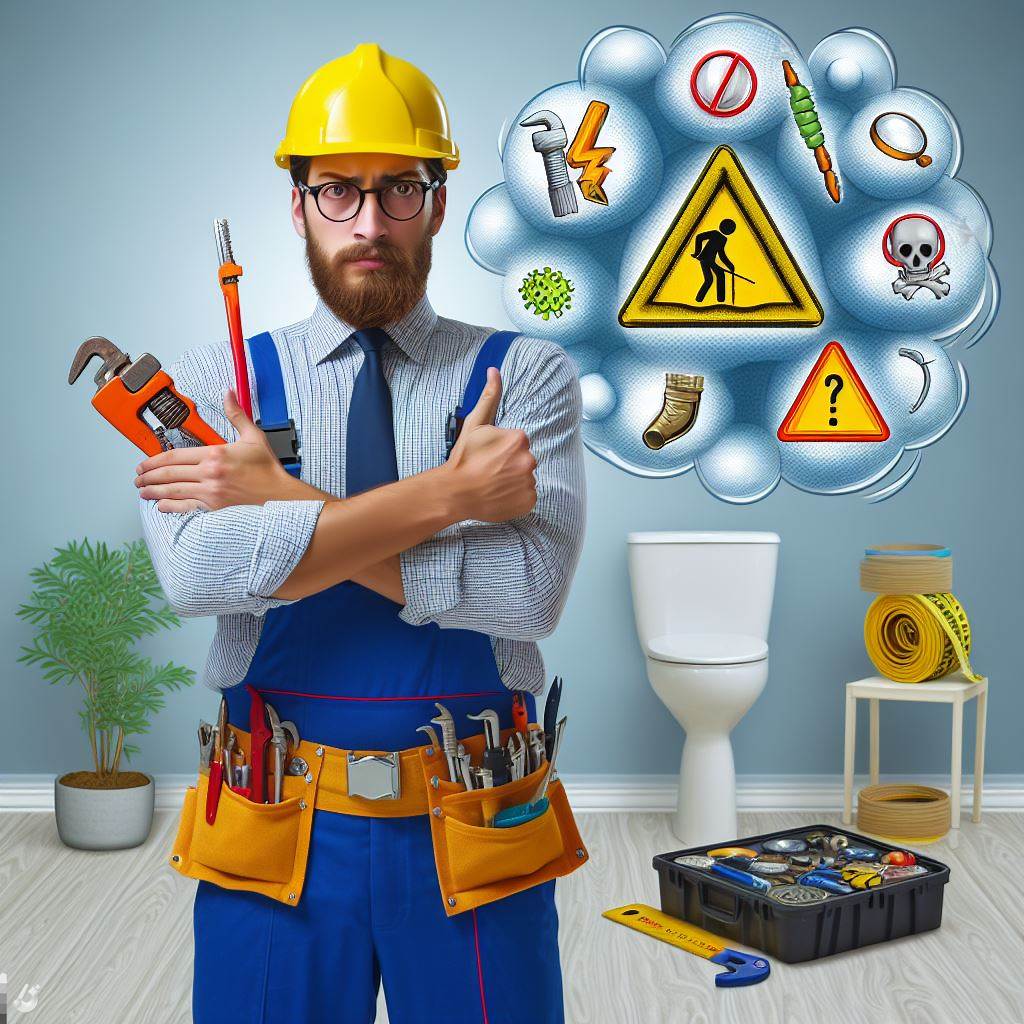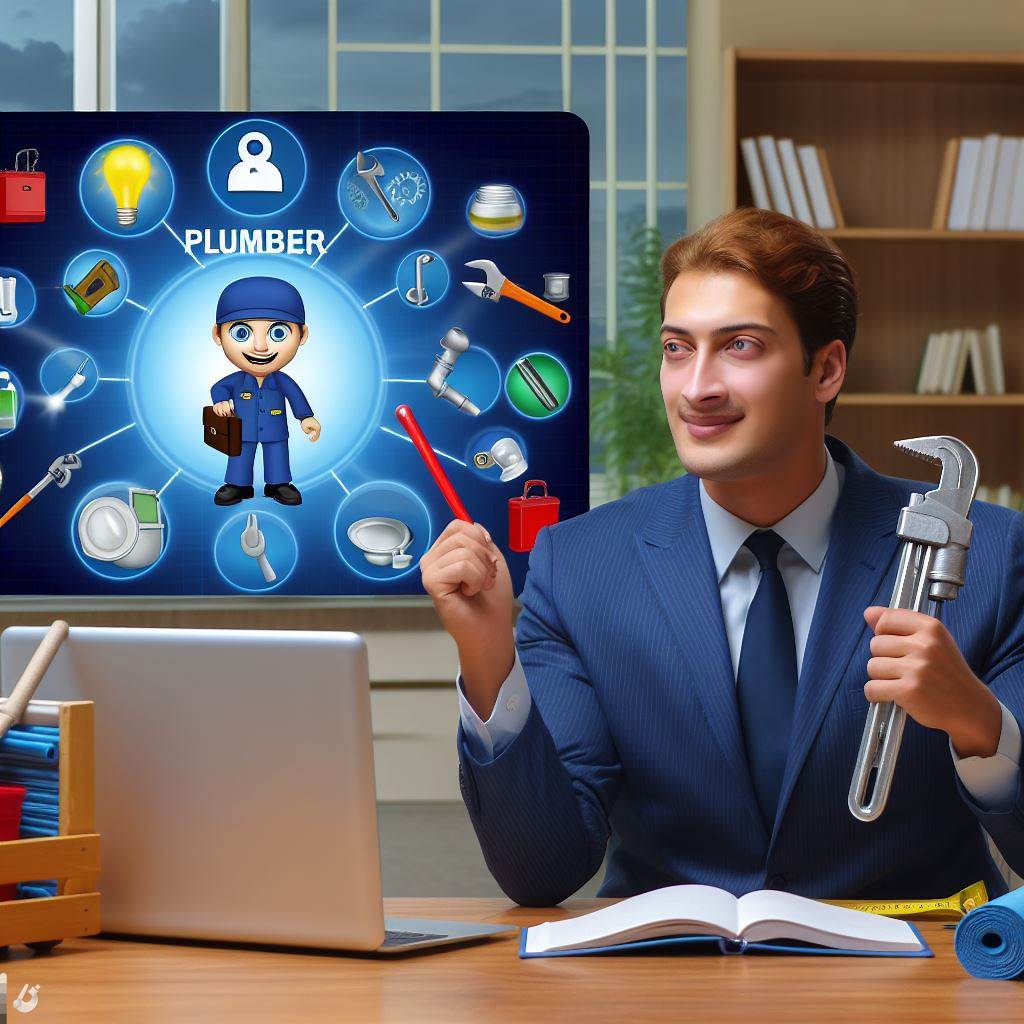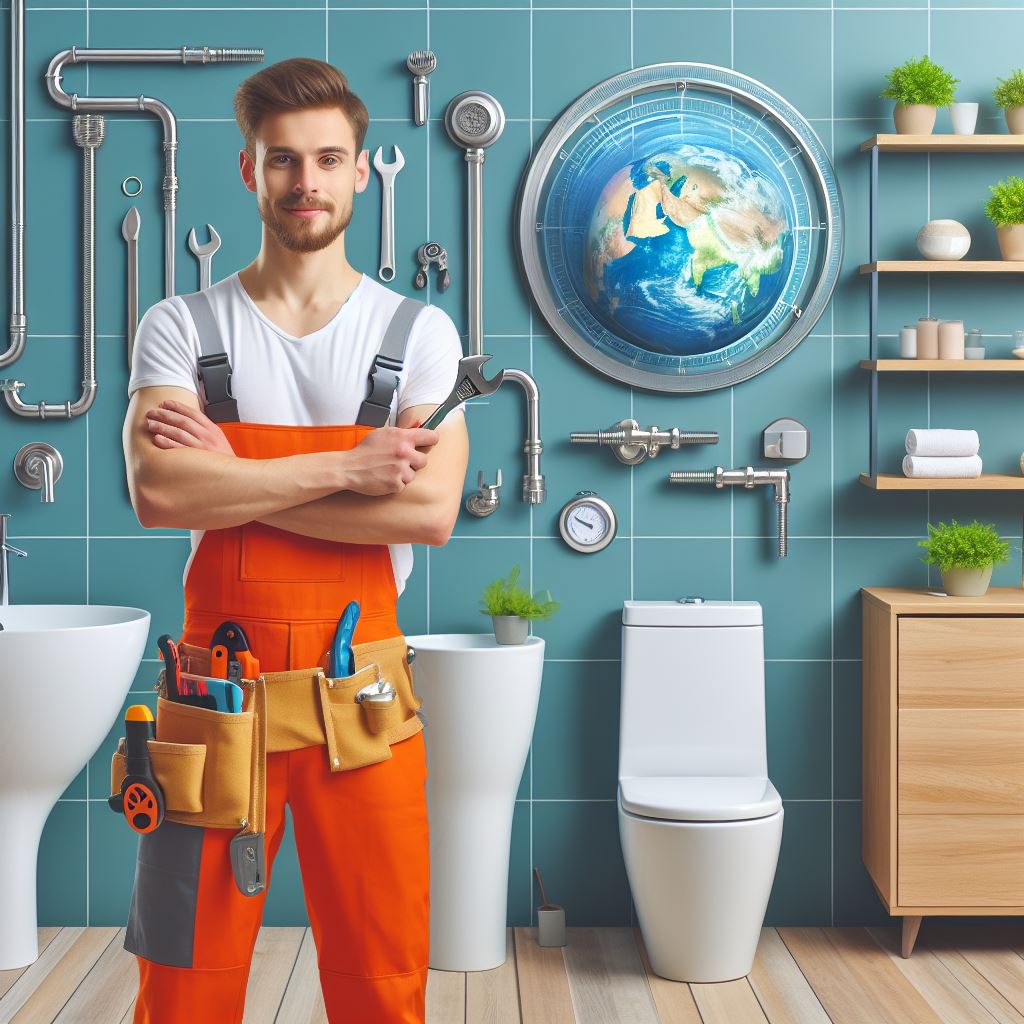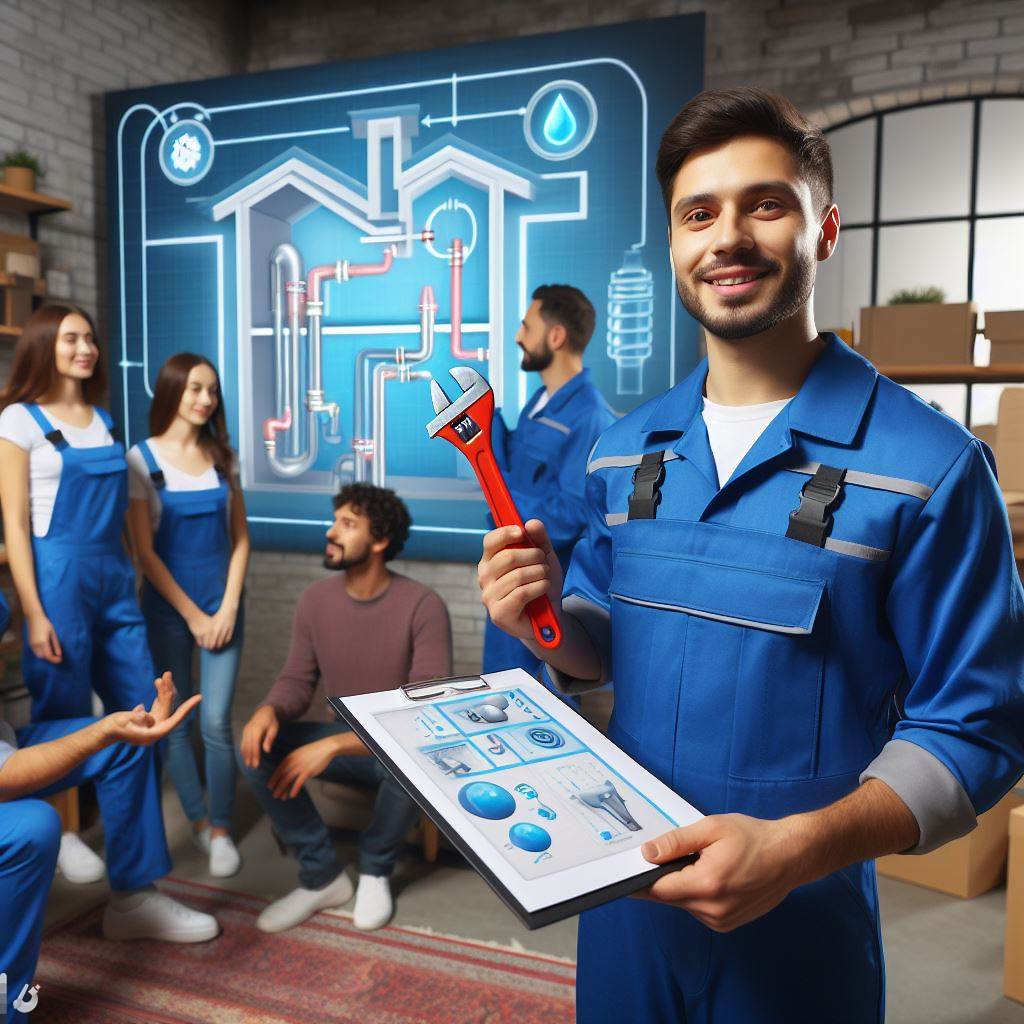Introduction
In the realm of UK plumbing, prioritizing safety is not just a legal requirement but a profound commitment to overall well-being.
This blog section emphasizes the critical importance of safety, transcending it from obligation to moral responsibility.
The purpose of this post is to delve into essential safety tips, empowering UK plumbers to create and maintain a secure working environment.
Beyond mere compliance, these insights aim to instill a proactive approach to safety.
By integrating these tips into their practices, plumbers contribute to a workplace that not only meets regulatory standards but also ensures the safety and security of both themselves and the clients they serve.
In essence, this section serves as a guide to fostering a culture of safety within the dynamic and vital profession of plumbing in the UK.
Safety Equipment
Plumbers often work in hazardous environments, which can expose them to various risks.
It is crucial for UK plumbers to prioritize safety by using the appropriate equipment and protective measures.
In this section, we will focus on the essential safety equipment that plumbers should employ to ensure their well-being on the job.
Personal Protective Equipment (PPE)
Gloves, Safety Glasses, and Hard Hats
Plumbers must wear gloves to protect their hands from sharp objects, chemicals, and potential infections.
Safety glasses are essential to shield the eyes from debris, spills, and splashes.
Hard hats are important to prevent head injuries caused by falling objects or accidental bumps.
Protective Clothing and Footwear
Plumbers should wear protective clothing, such as coveralls or work uniforms, to safeguard against cuts, burns, and chemicals.
Additionally, appropriate footwear, such as steel-toed boots, provides protection from punctures and trip hazards.
Respiratory Protection
Importance of Wearing Masks or Respirators
Plumbers often encounter hazardous fumes, gases, or airborne particles that can be harmful to their respiratory system.
Personalized UK Career Consulting
Receive tailored career guidance designed just for you. Get actionable steps and expert support to boost your career in 1-3 days. Take control of your career now.
Get StartedWearing masks or respirators is crucial to prevent inhalation of toxic substances and maintain good lung health.
Different Types of Respirators and Their Uses
There are various types of respirators available, and plumbers must select the most suitable one for their specific tasks.
For example, particulate respirators filter out dust and mists, while gas and vapor respirators protect against chemical fumes and gases.
By investing in and properly utilizing the right safety equipment, plumbers can significantly reduce their risk of accidents, injuries, and long-term health issues.
Therefore, safety should be the top priority for UK plumbers.
Personal protective equipment, including gloves, safety glasses, and hard hats, should always be worn to safeguard against potential hazards.
Additionally, proper protective clothing and footwear must be utilized to avoid injuries.
Plumbers should also prioritize respiratory protection by wearing masks or respirators, depending on the nature of their work.
Understanding the different types of respirators and their appropriate uses is crucial in ensuring maximum safety.
By adhering to these safety practices and utilizing the necessary equipment, plumbers can work with confidence, knowing that they are prioritizing their well-being on the job.
Read: Plumbing Regulations in the UK Simplified
Safe Work Practices
As a plumber in the UK, it’s important to prioritize safety in your work practices.
By following these essential safety tips, you can minimize the risk of accidents and injuries.
Proper lifting techniques
One common cause of injuries for plumbers is improper lifting.
Your Dream Job Starts with a Perfect CV
Get a tailored CV and cover letter that captures your unique strengths and stands out in your industry. Let us help you make an unforgettable first impression.
Get StartedTo prevent back injuries:
- Always lift with your legs and not your back.
- Use your core muscles to stabilize your spine while lifting.
- Avoid twisting or bending while carrying heavy objects.
- Take regular breaks to rest and stretch to avoid muscle strain.
Additionally, make use of lifting aids and equipment whenever possible to minimize the strain on your body.
Fall prevention
Working at height is another area where accidents can occur.
It’s essential to take fall prevention measures:
- When working on elevated surfaces, such as roofs or scaffolds, always use proper fall protection equipment.
- Regularly inspect and maintain your scaffolds and ladders to ensure they are in good condition.
- Ensure proper ladder safety by securing it correctly and maintaining three points of contact at all times.
- Avoid overreaching and leaning too far while on a ladder or scaffold.
Working in confined spaces
Plumbers often have to work in confined spaces, which can present unique safety challenges.
Follow these precautions:
- Conduct a risk assessment before entering a confined space to identify potential hazards.
- Adhere to permit-to-work systems to ensure proper authorization and safety measures are in place.
- Ensure adequate ventilation and monitor gas levels to prevent asphyxiation or exposure to harmful gases.
- Use personal protective equipment (PPE), such as respirators, as necessary.
By implementing these safe work practices, you can greatly reduce the risk of accidents and injuries while working as a plumber in the UK.
Prioritizing safety not only protects yourself but also helps maintain a professional and reputable business.
Read: UK Joinery Apprenticeships: A Complete Guide

Electrical Safety
Electrical safety is of utmost importance for plumbers working in the UK.
While plumbing primarily deals with water systems, there are instances where electrical elements come into play.
It is crucial for plumbers to be aware of electrical safety measures to avoid accidents and potential hazards.
This section will discuss two important aspects of electrical safety: identifying exposed live wires and the significance of ground fault circuit interrupters (GFCIs).
Identifying exposed live wires
To ensure overall safety, it is vital to identify whether wires are live or not.
Optimize Your LinkedIn for Success
Boost your LinkedIn profile with a professional bio, keyword-rich headline, and strategic recommendations that attract recruiters. Stand out from the crowd and get noticed.
Optimize NowProper testing and labeling should be conducted to accurately distinguish exposed live wires from inactive ones.
This involves using electrical testers to confirm the presence of voltage in the wires.
Additionally, plumbers must always turn off the power supply before working with any electrical components.
This precautionary measure should be followed to avoid electric shocks and other hazardous situations.
Before commencing any plumbing tasks, verifying that the power is turned off is essential to minimize the risk of accidents.
Ground fault circuit interrupters (GFCIs)
GFCIs play a crucial role in electrical safety.
These devices are designed to protect individuals from electrical shocks by automatically detecting any imbalances in electrical circuits.
In the event of an imbalance, the GFCI interrupts the electric current, preventing potential injuries or fatalities.
It is highly important for plumbers to use GFCIs when working in areas that have water sources, such as kitchens, bathrooms, or outdoor spaces.
GFCIs provide an additional layer of protection by minimizing the risk of electrical accidents caused by faulty appliances or damaged wiring.
To ensure the effectiveness of GFCIs, regular testing is necessary.
This involves pushing the “Test” button on the GFCI itself to simulate a ground fault condition.
The GFCI should immediately interrupt the power supply.
If it fails to do so, it is crucial to replace the faulty GFCI immediately.
Proper installation of GFCIs is equally important.
It is recommended to consult a qualified electrician for installation guidelines and to ensure compliance with electrical safety regulations.
Installing GFCIs incorrectly may compromise their ability to provide protection and may even increase the risk of electrical accidents.
Most importantly, electrical safety is an essential aspect of plumbing work in the UK.
Plumbers must be able to identify exposed live wires accurately through proper testing and labeling.
Moreover, incorporating ground fault circuit interrupters (GFCIs) in areas with water sources is crucial for preventing electrical accidents.
Regular testing and following proper installation guidelines are vital to ensure the effectiveness of GFCIs.
Professional plumbers prioritize electrical safety to create a secure working environment and protect themselves and their clients from potential hazards.
Read: Joinery Business Tips for UK Entrepreneurs
Hazardous Materials and Chemicals
Proper handling and storage of hazardous materials and chemicals are vital for the safety of UK plumbers.
Plumbers often come into contact with various substances that can pose health risks if not handled correctly.
The following section provides essential safety tips for UK plumbers regarding hazardous materials and chemicals.
Proper handling and storage
- Identifying hazardous substances: UK plumbers should be able to identify hazardous materials accurately. This knowledge helps them understand the potential dangers associated with each substance.
- Safe storage practices and labeling: It is crucial to store hazardous materials properly to minimize the risk of accidents. Containers should be correctly labeled with clear instructions and warnings.
Health risks and precautions
- Understanding potential respiratory hazards: UK plumbers must be aware of the respiratory hazards associated with hazardous materials and chemicals. Inhalation of toxic fumes or particles can lead to severe health issues.
- Proper use of Safety Data Sheets (SDS): Plumbers should always refer to SDS provided by manufacturers for detailed information on hazardous substances. SDS provides instructions for safe usage, handling, and emergency procedures.
Awareness and caution in handling hazardous materials and chemicals are essential for UK plumbers’ safety.
Proper identification of hazardous substances ensures that plumbers are aware of the potential dangers they face.
UK plumbers should also follow safe storage practices, as improper storage can lead to leaks, spills, or even explosions.
Additionally, understanding respiratory hazards is crucial for plumbers.
Many hazardous materials release toxic fumes that can cause respiratory problems or damage lung tissue.
Wearing appropriate respiratory protective equipment, such as masks or respirators, is essential when working with such substances.
To further ensure safety, plumbers must rely on Safety Data Sheets (SDS) provided by manufacturers.
SDS contain crucial information about hazardous materials and chemicals, including their composition, physical properties, and health hazards.
Plumbers should carefully read and follow the instructions and precautions given in the SDS to minimize the risk of exposure and accidents.
In fact, proper handling and storage of hazardous materials and chemicals are paramount for the safety of UK plumbers.
Identifying hazardous substances, implementing safe storage practices, understanding respiratory hazards, and utilizing Safety Data Sheets are crucial steps to prevent accidents and protect plumbers’ health.
By prioritizing safety measures, UK plumbers can carry out their work efficiently and with minimal risks.
Read: DIY Joinery: UK Home Enthusiasts’ Guide
Emergency Response and First Aid
In the plumbing profession, it is essential for UK plumbers to be well-prepared to handle emergency situations and provide immediate first aid when needed.
In this section, we will discuss fire safety and prevention measures, as well as basic first aid knowledge that every plumber should possess.
Fire safety and prevention
Plumbers often work in environments where fire hazards may be present.
Identifying these hazards is the first step towards preventing fires and ensuring the safety of both the plumber and the client’s property.
Some common fire hazards in plumbing work include exposed electrical wiring, flammable gases, and combustible materials.
To effectively prevent fires, it is crucial for plumbers to have a thorough understanding of various fire extinguisher types and their appropriate usage.
Different types of fires require different extinguishing agents, such as water, foam, or carbon dioxide.
Plumbers should be familiar with the specific extinguisher requirements for their work environment and know how to operate them correctly.
Basic first aid knowledge
Accidents can happen anytime, anywhere, including while working as a plumber.
Having basic first aid knowledge can make a significant difference in providing immediate assistance to someone in need.
Here are a few essential skills every plumber should acquire:
- CPR and AED training: Cardiopulmonary resuscitation (CPR) is a life-saving technique used to revive someone whose heart has stopped beating.
Plumbers should undergo CPR training to ensure they can respond promptly in case of cardiac emergencies.
Additionally, familiarity with automated external defibrillators (AEDs) can further boost the chances of saving a life. - Dealing with common injuries on the job: Plumbers should be prepared to handle common injuries that may occur while working.
This includes knowing how to administer first aid for cuts, burns, sprains, or electrical shocks.
Properly cleaning and dressing wounds, applying cold compresses, and immobilizing sprained joints are essential skills to possess.
By being proactive in fire safety and having basic first aid knowledge, UK plumbers can protect themselves, their clients, and their work environments.
Prevention is key, so it is vital to identify fire hazards and take appropriate measures to minimize the risks.
Additionally, being trained in CPR and first aid equips plumbers with the skills necessary to respond effectively in emergency situations.
Remember, safety should always be a top priority in the plumbing profession.
Conclusion
It is crucial for UK plumbers to prioritize safety in their work.
By following these essential safety tips – wearing appropriate PPE, using the right tools and equipment, maintaining a clean workspace, and being mindful of electrical hazards – plumbers can significantly reduce the risk of accidents and injuries.
Continuous safety training and awareness should also be encouraged to stay updated on the latest safety practices and regulations.
Remember, safety is not just a one-time thing, but a constant effort to ensure the well-being of both the plumbers and their clients.
[E-Book for Sale]
500 Cutting-Edge Tech Startup Ideas for 2024 & 2025: Innovate, Create, Dominate
$19.99 • 500 Tech Startup Ideas • 62 pages
You will get inspired with 500 innovative tech startup ideas for 2024 and 2025, complete with concise descriptions to help you kickstart your entrepreneurial journey in AI, Blockchain, IoT, Fintech, and AR/VR.




